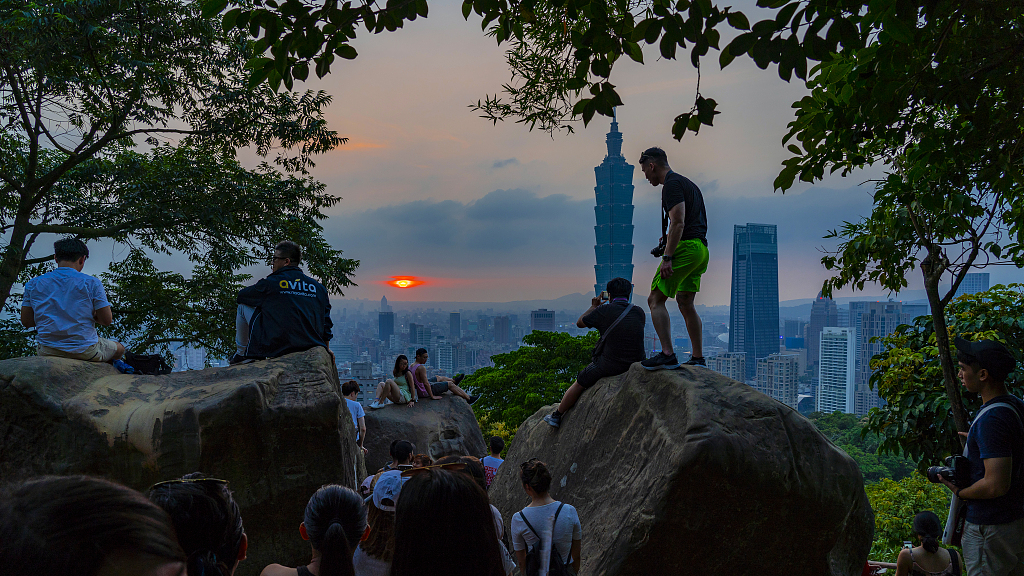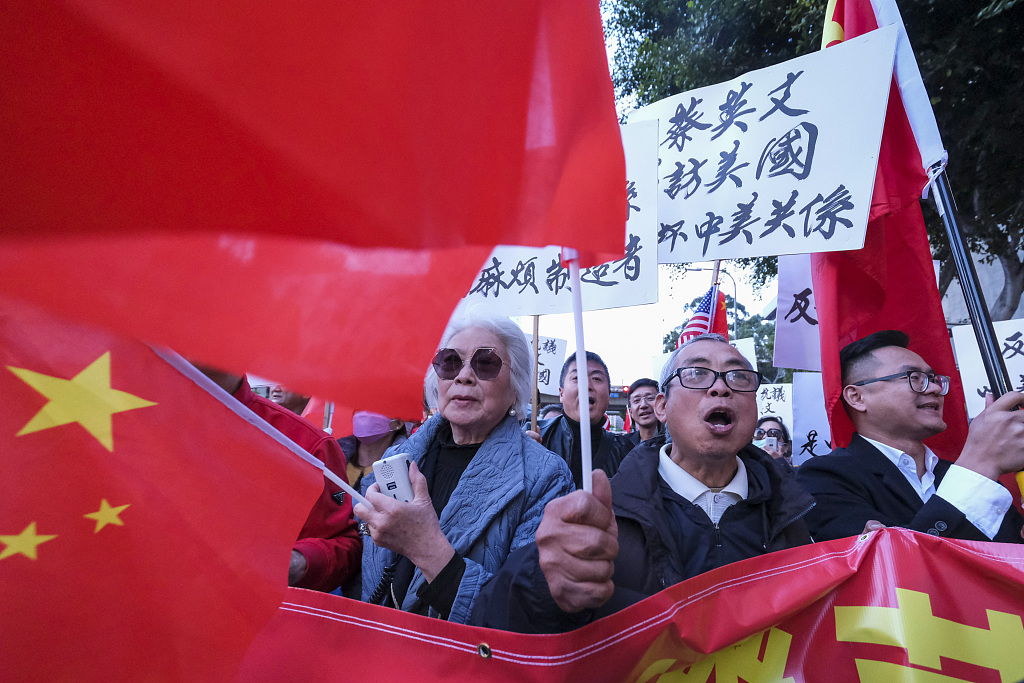
People watch the Taipei 101 skyscraper from the Xiangshan observation deck, May 18, 2018. /CFP
People watch the Taipei 101 skyscraper from the Xiangshan observation deck, May 18, 2018. /CFP
Editor's note: Josef Gregory Mahoney is a professor of politics and international relations at East China Normal University and senior research fellow in the Institute for the Development of Socialism with Chinese Characteristics at Southeast University. The article reflects the author's opinions and not necessarily those of CGTN.
The unimaginative leader of the "imaginary country" of Tsai Ing-wen panders to Kevin McCarthy's post-Pelosi rescue fantasy in a propaganda presser. The "Tinder date" equivalent of hit-it-and-quit-it diplomacy but with a TikTok throwback soundtrack: We Ain't Talkin' About Love or 99 Luftballons. Rather this is an awkward slow dance to the latter day Cold War classic by R.E.M.: World Leader Pretend.
Forgive the 1980s nostalgia and indulge a few memories from four decades ago. On November 20, 1983, as then U.S. President Ronald Reagan induced hysteria of a coming conflict with the Soviet Union, a made-for-television film, The Day After, ran on the ABC television network. Watched by more than 100 million people, it depicted a full-scale nuclear war between the U.S. and the Soviet Union and its aftermath, including severely injured survivors fighting each other for survival in the rubble as they grew sicker from radiation sickness, along with summary executions of looters under martial law.
I was 12 years old then, and the day after watching The Day After, teachers at my school and others held discussion sessions about the film. What I recall the teacher asking is whether we'd rather die in the initial attack or face the hardscrabble circumstances that followed. There was a lively debate. One kid said he'd rather die than face a world where his friends were dead. Others were more defiant.
Later on that day, we had a nuclear attack drill. We didn't have a bomb shelter, so we used the same method for a tornado drill: All the students sat on the floor in the hallway with their backs against their lockers. The teachers told us to brace ourselves, to put our heads down, between our knees. One student complained: "This is stupid. We know it wouldn't save us. So why are we doing it?"
In 1987, as the Soviet Union was negotiating what was later ratified by both nations as the Intermediate-Range Nuclear Forces (INF) Treaty in 1988, the film was shown in the Soviet Union with Russian subtitles. It's difficult to estimate the extent to which the film contributed to a more realistic understanding of the dangers associated with the great power competition of that era, an era that was first sparked by the U.S. striking Japan twice with nuclear weapons in 1945, and then dangerous flirtations with even greater potential for tragedy given the tit-for-tats of the U.S. trying to place nuclear weapons in Turkey and the Soviet Union attempting something similar in Cuba. But after the U.S. retreated from Vietnam and the Soviet Union retreated from Afghanistan, there was less Cold War confidence despite the echoes of bravura from both capitals. In fact, the people of the two countries were coming to their senses.
And yet, here we are, 40 years later, Russia having recently exited the New Strategic Arms Reduction Treaty (START), the U.S. stationing nuclear capable bombers in northern Australia and selling nuclear submarines to Canberra. The U.S. and Russia are fighting a proxy war over the future of the petrodollar in Ukraine, while the U.S., many fear, is plotting the "Ukrainization" of China's Taiwan region, as it piles in as many nuclear assets as it can in the name of security.
This is the context that haunts the leader of China's Taiwan region Tsai Ing-wen's meeting with U.S. House Speaker Kevin McCarthy in California. Fittingly enough, the meeting was held at the Ronald Reagan Presidential Library in Simi Valley, deliberately evoking that old Cold War cajoler who terrorized my childhood by building a dark coalition of social and fiscal conservatives to resist social justice and social progress. He embarked a deep trend of financial deregulation that continues to this day, having hollowed out the middle class and left the people of my generation committing suicide at higher rates than any other developed country in the world, while reasserting the U.S. as an imperialistic power worldwide.

Protesters gather at a hotel where Tsai Ing-wen is expected to arrive in Los Angeles, California, U.S., April 4, 2023. /CFP
Protesters gather at a hotel where Tsai Ing-wen is expected to arrive in Los Angeles, California, U.S., April 4, 2023. /CFP
"But thanks to Reaganomics, prison turned to profits / Cause free labor's the cornerstone of U.S. economics," as the leftist rapper "Killer Mike" tells us in his song, "Reagan," his own reflection of being a young black male at the end of the Reagan era. But in the same moment, more or less, I was listening to R.E.M.'s new album, Green (1988), its lead single evoking the images of American war crimes in Vietnam, but it's most powerful message in another track, "World Leader Pretend." Here are some of the lyrics:
"I sit at my table and wage war on myself / It seems like it's all, it's all for nothing / I know the barricades and I know the mortar in the wall breaks / I recognize the weapons, I've used them well."
As I recall the 1980s and the American "old head" nostalgia that pushed down that dark path once again. As I look on from my little perch in Shanghai, counting as best I can the iron ticks of the nuclear clock. I think of the U.S. nuclear submarine that crashed recently into a seamount in the South China Sea. I think of the U.S. bombers in Australia. I think of the weapons and U.S. military personnel already in Taiwan region.
I shake my head as the U.S. imagines a TikTok conspiracy and "weather airship invasion," recalling Nena's lyrics in her own Cold War classic, "Worry, worry, super scurry / Call the troops out in a hurry, this what we've waited for / This is it, boys, this is war."
Here we are, the day after Tsai met McCarthy, and I wonder, do we need another The Day After film to shake us to our senses? Should we start replaying the music of the 1980s to recall the political stupidity of that era? Isn't this just a joke? Didn't these fools already learn? Must history repeat itself or worse?
(If you want to contribute and have specific expertise, please contact us at opinions@cgtn.com. Follow @thouse_opinions on Twitter to discover the latest commentaries in the CGTN Opinion Section.)